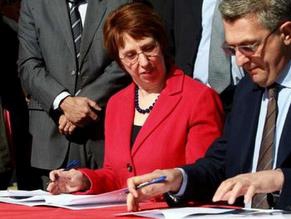|
World Jewish News

Catherine Ashton (L) and the Commissioner-General of the UNRWA Filippo Grandi signed this week at the Gaza Training Centre in UNRWA's compound a 55,4 million dollars financing agreement towards UNRWA’s general fund.
|
Catherine Ashton and UNWRA sign in Gaza financing agreement
29.01.2012, Israel and the World The European Union foreign policy chief and Vice-President of the European Commission Catherine Ashton, and the Commissioner-General of the United Nations Relief and Work Agency for Palestine Refugees in the Near East (UNRWA), Filippo Grandi, signed this week at the Gaza Training Centre in UNRWA's compound a 55,4 million dollars (41,7 million euros) financing agreement towards UNRWA’s general fund.
The European Union foreign policy chief and Vice-President of the European Commission Catherine Ashton, and the Commissioner-General of the United Nations Relief and Work Agency for Palestine Refugees in the Near East (UNRWA), Filippo Grandi, signed this week at the Gaza Training Centre in UNRWA's compound a 55,4 million dollars (41,7 million euros) financing agreement towards UNRWA’s general fund.
The EU contribution is the largest single donation to UNRWA’s core budget, which supports the agency’s regular activities in education, health, relief and social services and camp improvement. The grant will fund these essential services to Palestine refugees throughout Gaza, the West Bank, Jordan, Syria and Lebanon.
Speaking at a signing ceremony at UNRWA's Vocational Training Centre in Gaza City, Ashton said during her visit to Gaza earlier this week that "the continued EU support to UNRWA is an essential element of the EU strategy to bring peace and stability to the region."
"The 55.4 euros million contribution we are signing today represents our ongoing commitment to Palestine refugees," she said.
Filippo Grandi expressed gratitude to the EU for its firm support of UNRWA: "I would like EU citizens to know that thanks to their generosity, refugee children will go to school, the health of families and communities will be improved and many of the most vulnerable Palestinians will be less poor."
EJP
|
|
